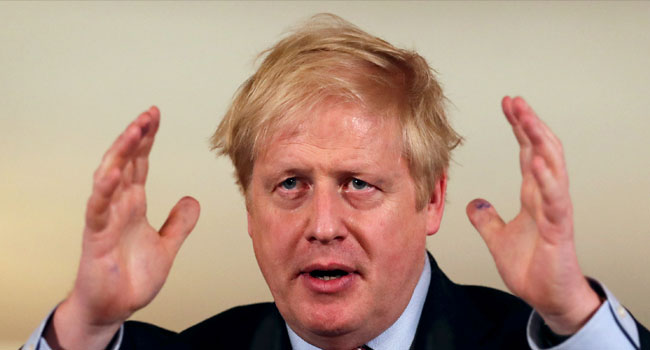By Jeph Ajobaju, Chief Copy Editor
There are more skilled jobs than workers to take them up in the United Kingdom as post-pandemic reopening of social and economic sectors rose the fastest in May in more than two decades.
That finding based on a survey by KPMG coincides with news that British exports worth billions of pounds have faced tariffs on trade with the European Union (EU) since Brexit, according to an analysis of official EU statistics reported by the BBC.
Despite the tariff-free deal agreed with the EU, a study by the University of Sussex found up to £3.5 billion of British exports had taxes applied.
That accounts for about 10 per cent of British goods exports to the EU.
Some firms paid due to the complexity of claiming zero tariffs, or said they planned to reclaim the fees later.
For exporters, maintaining zero tariffs under the post-Brexit deal is not automatic: it needs to be claimed on customs declarations that from January have had to accompany every export to the EU.
An analysis for the BBC, by the University of Sussex’s Trade Policy Observatory, used European customs data from these declarations.
The figures indicated that between £2.5 billion and £3.5 billion of British exports faced a tariff in the first three months of 2021 (Q1 2021).
The European Commission confirmed that according to data collected by its customs authorities, €2.5 billion of eligible UK exports did not use the zero-tariff agreement.
“Tariff-free trade is only tariff-free if firms not only meet the rules of origin criteria, but also can deal with the necessary bureaucracy and paperwork,” said Prof Michael Gasiorek, trade expert at the University of Sussex.
“What this analysis shows is that in the first quarter, around 27 per cent of trade that could have entered tariff-free did not do so.
“In some sectors and for some firms, this will no doubt improve, but it reflects the reality that leaving the EU has imposed real costs on firms, with long-term implications for trade and production.”
The data covers all British exports to the EU in January and February, and some reporting nations in March.
Individual businesses and groups told the BBC of instances where millions of pounds in tariffs had been paid.
Most put this down to complex arrangements for claiming zero tariffs, difficulties over the re-export to the EU of goods processed in Britain, and an expectation that some of these fees could eventually be recovered.
Some of the world’s biggest multinationals have paid seven-figure tariff bills.
Parts for rare vehicles
A classic car repairer, The Classic Car Mechanic, showed tariff bills of hundreds of pounds for car parts for rare vehicles sent to Hungary, which could not be valued, and so were hit with a tariff by French customs.
“We’ve had to pay a tariff, even though we’ve got a zero tariff,” said the boss of the business, Simon Spurrell.
“It’s the same with all the other shipments, all UK origin parts, but they dispute it and they hold it up.
“We feel that we have no fight left in us, we have to then, as a small organisation just say, well, we’ll cut our losses, and just pay the duty.”
The Trade Policy Observatory has tried to quantify the effect of extra trade barriers with the EU on different sectors.
Although exports began to recover from a massive drop in January, over the quarter, the Observatory calculated that, of the worst affected sectors, textiles saw exports fall 63 per cent, food suffered a 36 per cent drop, and the automotive industry saw exports down 20 per cent.
Other advanced manufacturing industries have not been affected, according to the analysis, which seeks to isolate the impact of post-Brexit barriers from the impact of the pandemic.
“The vast majority of traders have adjusted well to our new trading relationship with the EU,” a government spokesperson told the BBC.
“HMRC continues to work closely with exporters to ensure they correctly apply rules of origin requirements and are aware of their right to refunds.
“The unprecedented zero-tariff zero-quota deal we secured with the EU allows businesses to trade smoothly, while we can now regulate in a way that suits the UK economy and our businesses – doing things in a more innovative and effective way, without being bound by EU rules.”
Differences in free-trade deal
The analysis also showed that in the early months of the deal, there were some marked differences between EU nations in the extent of use of the free-trade deal for imports of British goods.
Data for what is known as “preference utilisation” of British exports to Germany shows rates well below half in January and February at 42 per cent and 44 per cent respectively.
The trade deal has been used more, according to the data, for exports to France, reaching 77 per cent in March.
Preference utilisation rates (PURs) measure the extent to which tariff preferences provided by a particular trade agreement are being used by imports and exports of either side.
European Commission sources stressed that overall use of the deal was in line with the first months of other free-trade deals and that it would take some time to assess the impact.
UK government ministers told Parliament in April that they would be releasing their equivalent data for EU exports into Great Britain shortly.
Skills shortage spurs job vacancies
The number of staff available to fill job vacancies in the UK declined at the quickest rate since 2017, and KPMG urged the government and firms to address skills gaps.
Workers were especially needed in IT and computing, which has been a long-term trend, as well as hospitality, the survey found, per BBC reporting.
Hospitality venues are struggling to fill thousands of job vacancies with waiting staff and chefs in particular demand as Covid-19 restrictions continue to ease, industry body UK Hospitality said in April.
Many hospitality firms have struggled during the pandemic despite extensive government support, including rates holidays and the furlough scheme, and staff have lost their jobs or seen their hours reduced.
The retail industry saw the least demand for workers.
This survey is based on responses from 400 recruitment and employment agencies and is yet more evidence of the economic recovery gathering pace.
It says hiring activity has intensified across all job categories, particularly in IT and computing and hotels and catering.
But there’s also a shortage of workers. Hospitality and events firms have been struggling to get the staff they need to cope with a post-lockdown surge in demand.
Some are warning of a staffing crisis this summer, partly caused by gaps left by EU workers who have returned home because of Brexit and the pandemic.
The survey’s authors say skills and labour shortages, that already existed before the pandemic, are now the most pressing issue in the jobs market.
This means many employers will need to look at the wages and benefits they offer at a time when they’re still struggling to financially recover from the last 14 months.
The jobs market “seems to be firing on all cylinders” said KPMG partner Claire Warnes.
“But the deterioration in staff supply intensified this month… This is a worrying trend,” she added.
She called for government and firms to “urgently address the skills gap”.
Kate Shoesmith, deputy chief executive of the Recruitment & Employment Confederation (REC), said: “With demand spiking, the skills and labour shortages that already existed in the UK have come into sharper focus – and Covid has only made them worse.
“This is the most pressing issue in the jobs market right now, and has the potential to slow down the recovery.”
A government spokesperson told the BBC: “Our multi-billion pound plan for jobs, including the Kickstart scheme, is supporting employers across the country to create jobs and help jobseekers get the skills and experience needed to develop their careers and fulfil roles for years to come.
“Additionally, we have increased the apprenticeship hiring incentive to £3,000 per new apprentice hire and our lifetime skills guarantee – worth the equivalent of around £3,400 per person – ensures all adults can gain new skills and qualifications.”















